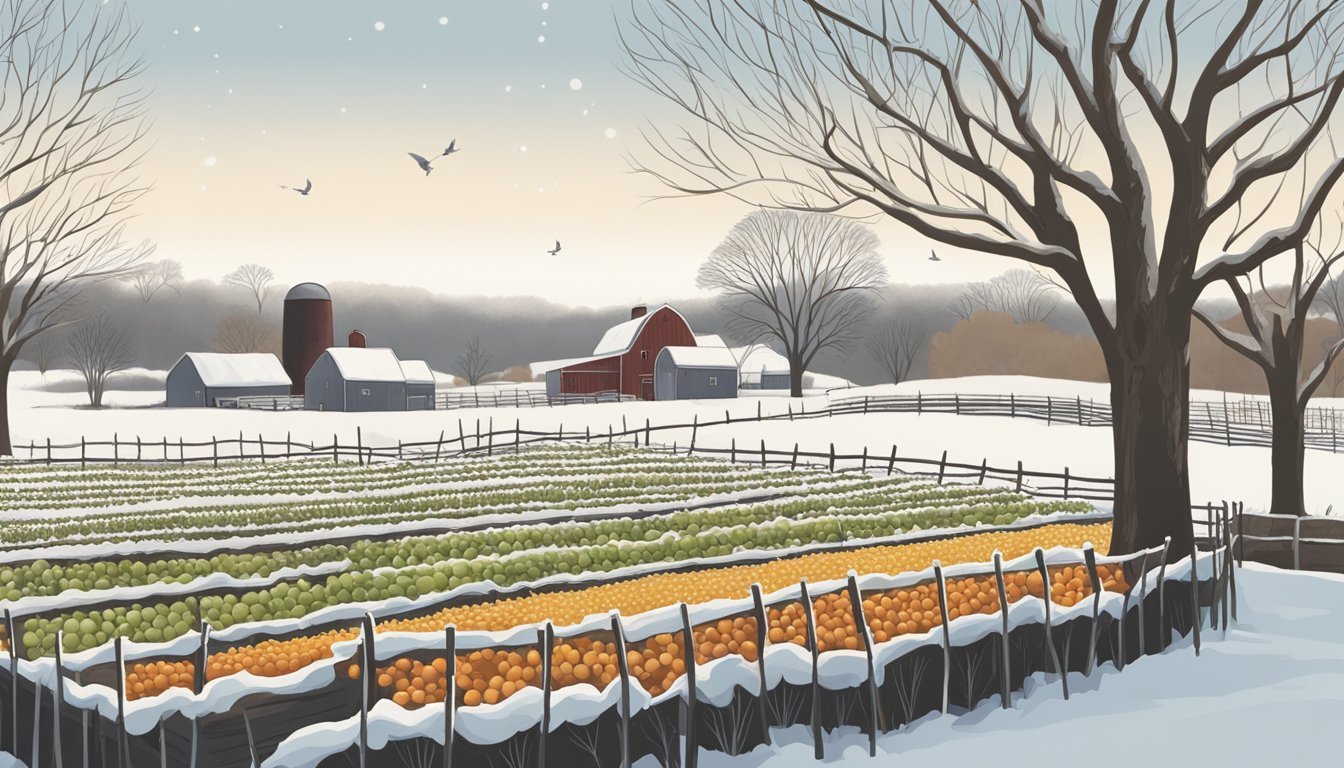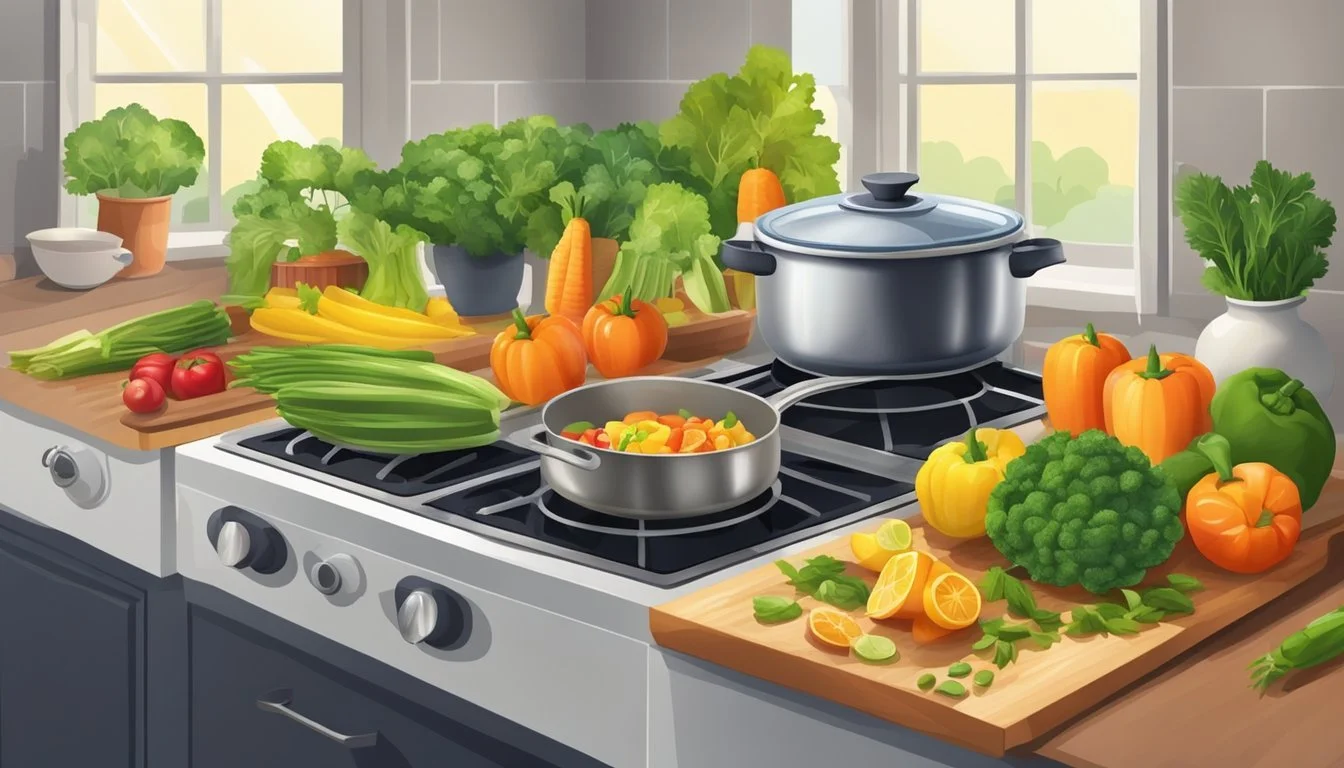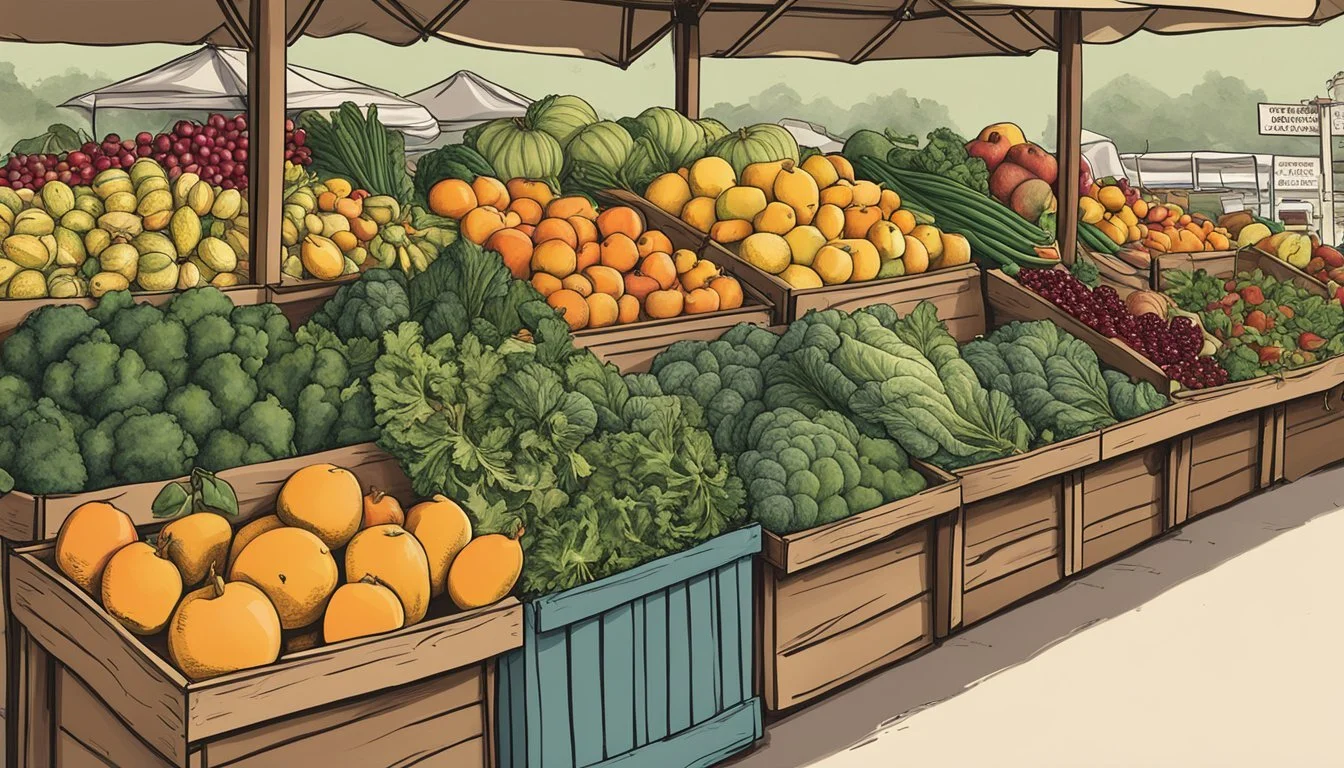Rhode Island Seasonal Fruit & Vegetables in December
A Guide to Winter Produce
This Article is Part of our Rhode Island Seasonal Fruit & Veg Calendar
Winter in Rhode Island brings a shift in available produce as the ground freezes and most plants go dormant. However, in these chillier months, the state still boasts a variety of fruits and vegetables that can be harvested. Consumers who prefer to eat seasonally and locally have options to enjoy fresh produce even during the coldest part of the year.
Root vegetables and hardy greens are staples of the season, as they are capable of withstanding lower temperatures. December in Rhode Island is marked by the presence of vegetables such as beets (how long do beets last?), carrots (how long do carrots last?), and potatoes, which are able to be stored well after harvest, ensuring a supply that lasts throughout the winter months.
While fruit selections are more limited in winter compared to the bountiful summer months, apples (how long do apples last?) still feature prominently in seasonal offerings. They, along with stored crops such as pumpkins, can be found in local markets, representing the tail end of the autumn harvest and the adaptations of Rhode Island farmers to a year-round agricultural cycle.
Understanding Rhode Island's December Climate
Rhode Island in December experiences the onset of the winter season, characterized by a cold and often snowy climate. Temperatures during this month typically range from 20°F to 40°F, setting a chilly backdrop for the winter harvest.
Average Highs and Lows:
High: 40°F (4°C)
Low: 20°F (-6°C)
The state sees a significant reduction in daylight hours, with shorter days and longer nights. This shift affects how plants grow and what crops can thrive during this time.
Daylight Hours:
Early December: Approximately 9 hours
Late December: Closer to 9 hours
Precipitation levels in December can include rain, sleet, and snow, heavily influencing agricultural patterns. Farmers must adapt their practices to protect against potential frosts and the freezing temperatures which can pose a risk to crops.
Precipitation:
Forms: Rain, Sleet, Snow
Impact: Frost and Freezing Conditions
Despite the cold, Rhode Island's December weather allows for the growth of hardy winter vegetables and the storage of autumn-harvested produce. This climate creates a unique environment where certain fruits and vegetables can even sweeten when kissed by frost.
December's Seasonal Vegetables in Rhode Island
In December, Rhode Island's cold climate dictates the availability of robust, hearty vegetables capable of withstanding lower temperatures. Residents and chefs alike turn to the following seasonal produce to enrich their winter menus with fresh, local ingredients.
Root Vegetables: The earthy depth of root vegetables shines in December. Harvested earlier and stored for winter use, vegetables like carrots, parsnips, and turnips offer versatility in cooking, from roasts to purees. Rutabaga, a cross between a turnip and a cabbage, provides a sweet and savory addition to dishes.
Cruciferous Vegetables: This family of vegetables is well-suited for colder weather. Brussels sprouts (how long do brussels sprouts last?)and cabbage, with their layers of leaves, are resilient against the winter chill. Both lend themselves to a variety of cooking methods, including roasting and braising. Broccoli and cauliflower (how long does cauliflower last?), though less hearty, also make appearances thanks to greenhouse cultivation, bringing green and white hues to the winter plate.
Hearty Greens: Kale and spinach are hardy greens that endure through Rhode Island's winter. Their leaves become even more tender after a frost, enhancing their flavor, which can be enjoyed raw in salads or sautéed as a warming side dish.
Winter Squash: With its harvest concluding in the fall, varieties of winter squash such as butternut and acorn can be stored and enjoyed throughout December. Their sweet, nutty flesh is ideal for soups, mashes, and baked goods.
Winter Staples Preparation Ideas Carrots Glazed, roasted, or in stews Cauliflower Roasted or as a creamy puree Brussels sprouts Caramelized with balsamic reduction Spinach Wilted in salads or as a side Winter squash Baked, in soups, or as pie filling
Rhode Island's December offerings demonstrate that even in the depths of winter, the local vegetable harvest remains diverse and abundant, providing nutritious options for seasonal eating.
December's Seasonal Fruits in Rhode Island
In December, shoppers in Rhode Island can enjoy a selection of fruits that are in the prime of their season. The winter months bring a modest variety to the local produce stands and farmers markets. Here is a list of fruits typically available during this time.
Apples: A fall-harvested fruit that withstands the cooler temperatures well into December. They come in many varieties, with some like the Fuji or Braeburn being particularly sweet and crisp, suitable for both eating raw and cooking.
Cranberries: Rhode Island's bogs yield cranberries up until early winter. These tart berries are a staple in holiday recipes and are commonly used in sauces, juices, and baked goods.
Pears: Similar to apples, some pear varieties are harvest-ready in the fall and remain available into early winter. Pears have a soft, buttery texture when ripe and are versatile in both savory and sweet dishes.
While not typically grown in Rhode Island due to the climate, certain citrus fruits reach their peak in other regions during the winter months, which allows them to be available in local stores:
Citrus Fruits: These include oranges, grapefruits, and tangerines. They are a popular choice during the winter season, offering a burst of freshness and a high vitamin C content.
Residents and visitors of Rhode Island can enjoy these fruits knowing they are experiencing some of the freshest and most flavorful produce the state has to offer during the chilly month of December.
Local Agriculture and Farming Techniques
Rhode Island's agricultural practices reflect a commitment to fostering a robust local food system. Farmers in the state adapt to the seasonal constraints, particularly in December, by employing innovative farming techniques to extend the growing season.
High Tunnels and Greenhouses: These structures enable farmers to protect crops from harsh winter weather, allowing for the extension of the production period. They are instrumental in cultivating vegetables such as leafy greens and root vegetables that can withstand cooler temperatures.
Crop Rotation and Cover Cropping: Farmers practice crop rotation to maintain soil health and manage pests and diseases. During winter, cover crops such as rye or clover are planted to preserve soil structure and fertility, which is essential for the subsequent growing season.
Hydroponics and Aquaponics: Some Rhode Island farms utilize hydroponic or aquaponic systems for year-round production. These soil-less agriculture methods are particularly useful for producing fresh greens and herbs irrespective of outdoor conditions.
Technique Description Benefits High Tunnels Protective structures Extends growing season Crop Rotation Planting different crops sequentially Improves soil, controls pests Cover Cropping Planting of specific crops post-harvest Protects and nourishes soil Hydroponics Soil-less growing with nutrient solutions Year-round production Aquaponics Combining fish farming with hydroponics Sustainable ecosystem production
Rhode Island's farmers also value sustainable and organic farming practices, emphasizing the health of their communities and land. This dedication not only supports the local economy but also ensures that Rhode Islanders have access to fresh and nutritious produce even in the depths of winter.
Health Benefits of Seasonal Eating
Seasonal eating, particularly in the month of December, involves the consumption of fruits and vegetables that are harvested at their peak in terms of freshness and flavor. It is widely understood that fruits and vegetables provide essential vitamins and minerals, but when consumed in season, the nutritional profile can be significantly higher.
Root vegetables, such as sweet potatoes, turnips, and carrots, are often at their best in December. They come packed with antioxidants and nutrients due to the dense soil they grow in, providing bodies with necessary fuel to bolster immunity during the colder months. These root vegetables are also rich in fiber, aiding in digestion and promoting a feeling of fullness, which can be beneficial for weight management.
Ingesting fresh fruit that is in season can lead to an intake of higher levels of antioxidants, which are crucial in combating inflammation and oxidative stress in the body. Although fruit selection may be limited in colder climates, options like pomegranates and various citrus fruits, which are ripe in December, offer vitamins like vitamin C and aid in immune system support.
Seasonal Produce Nutritional Benefits Root Vegetables High fiber, essential minerals like iron and potassium, antioxidants Fresh Fruit Vitamins, particularly vitamin C, antioxidants, dietary fiber
Consuming a diet rich in a variety of fruits and vegetables aligns with dietary guidelines aiming to improve overall health. Seasonal produce not only offers environmental benefits, such as reduced transport emissions but also can be more cost-effective. In December, selecting seasonal items ensures freshness, supports the local economy, and provides environmental sustainability.
Rhode Island's Farmers Markets in December
During December, Rhode Island's community continues to support local agriculture by hosting various winter farmers markets. These markets offer residents the opportunity to buy fresh, locally-sourced produce even during the cooler months.
Pawtucket Farmers Market operates biweekly on Fridays, offering a place for local producers to sell their goods. Located at The Guild, this market is accessible during the hours of 12 PM to 3 PM.
In Newport, the Aquidneck Growers Market holds a weekly market at Stoneacre Garden. This Saturday market, which runs from 9 AM to 12 noon, enables shoppers to find fresh produce and other locally made food products.
Residents of South Kingstown have the option of pre-order pickups at Independence Square, ensuring they can still access fresh fruit and vegetables without the traditional market setup.
Throughout other parts of the state, farmers and producers may also host farm stands that adhere to the seasonal nature of their offerings, providing another outlet for consumers to support Rhode Island's farming community.
Market Name Location Day(s) Time Pawtucket Farmers Market 461 Main St, Pawtucket Biweekly Fri 12 PM - 3 PM Aquidneck Growers Market 151 Stoneacre Row, Newport Weekly Sat 9 AM - 12 PM South Kingstown Pre-Order Pickups 25 W. Independence Way, South Kingstown Weekly Sat 10 AM - 12 PM
These markets not only offer quality produce but also sustain the local economy and foster a sense of community throughout the colder season.
Preparing and Cooking Seasonal Produce
In Rhode Island, December brings a reduced variety of fresh produce, but the available fruits and vegetables can be transformed into delicious meals and preserves with the right approach.
Vegetables: Root vegetables, such as beets and carrots, are staples during this time. They can be roasted to enhance their sweetness or used in hearty stews and soups for warmth on cold days. To retain nutrients and texture, steaming is also an advantageous cooking method.
Fruit: While fresh fruit options are limited, apples stored from the fall harvest remain a versatile choice. Apples can be baked into desserts like pies and tarts or cooked down into sauces and jams. Adding spices such as cinnamon and nutmeg (how long does nutmeg last?) can elevate the natural flavor of apple-based dishes.
Desserts: Utilizing the season’s produce, one can make an array of desserts. Roasted vegetables can be incorporated into sweet pies or cakes, creating a unique flavor profile. For example, carrot cake is a comforting treat that showcases seasonal produce.
Jams: Preserving fruits by making jams is not only a way to enjoy the seasonal bounty but also to minimize food waste. Jams made in December can include apple, cranberry, and even pear if available. They require minimal ingredients: the fruit itself, sugar, and pectin (how long does pectin last?). The resulting jam can be a delightful spread for morning toast or a thoughtful homemade gift.
Below is a simple chart showcasing how to prepare some of Rhode Island’s December produce:
Produce Preparation Method Suggested Use Beets Roasted or Boiled Salads, Sides Carrots Steamed or Roasted Soups, Cakes Apples Baked or Cooked Desserts, Jams
One should remember to clean all fruits and vegetables thoroughly before use to ensure food safety. When preparing seasonal produce, maintaining a balance between enhancing natural flavors and preserving nutrients is key.
Storing and Preserving Techniques
In Rhode Island, the cold months of December bring a limited, but valuable selection of seasonal produce. Various techniques ensure these items remain viable for consumption during this season.
Root Vegetables: They typically have a longer shelf life. For preservation:
Cellaring: Store in cool, humid, and dark spaces.
Freezing: Blanch and freeze for extended use.
Celery Root: Also known as celeriac, it requires specific conditions:
Refrigeration: Wrap in plastic and store in the crisper drawer.
Root Cellaring: Can be stored as other root vegetables.
Syrup: Homemade syrup preservation needs:
Canning: Boil syrup, pour into sterilized jars, and seal.
Refrigeration: Store in airtight containers to prolong freshness.
For fruits and vegetables:
Drying: Use dehydrators or ovens.
Pickling: Submerge in vinegar or brine.
Ensure all produce is:
Cleaned: Wash under running water.
Segregated: Store away from raw meats to prevent cross-contamination.
Preservation Method Suggested Items Notes Cellaring Root Vegetables Cool, humid, dark Freezing Root Vegetables Blanch before freezing Refrigeration Celery Root, Syrup Use crisper; airtight containers Drying Fruits Thin slices for even drying Canning Syrup Sterilized jars; seal properly
Adhering to these preservation methods, Rhode Island residents can maximize the lifespan and flavor of their available seasonal produce, maintaining a consistent and safe food supply through the winter.
Conclusion
In Rhode Island, residents have the privilege of accessing a variety of fruits and vegetables that are at their peak during December. This winter month is an opportunity to embrace locally-grown produce that not only supports the regional economy but also promises freshness and flavor.
Seasonal Vegetables:
Beets
Broccoli
Carrots
Cauliflower
Collards
Garlic
Kale
Leeks
Mushrooms
Onions
Parsnips
Potatoes
Pumpkins
Radishes
Brussels sprouts
These vegetables, with their robust flavors and textures, make them winter favorites for hearty meals and nourishing soups.
Seasonal Fruits: While the winter season may not be as abundant in fruits as the summer, Rhode Island still offers its share, such as:
Apples (late varieties)
Stored harvests like pears
The limited variety of fruits emphasizes the importance of creativity and appreciation for the seasonal produce available.
Residents planning their meals or looking for fresh ingredients should keep in mind these winter offerings. Incorporating these items into their diets can not only provide culinary diversity but also ensure the intake of nutrients vital during the colder months. Chefs and home cooks alike understand the profound impact that using seasonal, local produce has on the flavor and nutritional content of their dishes, making December an ideal time to explore Rhode Island's seasonal bounty.







